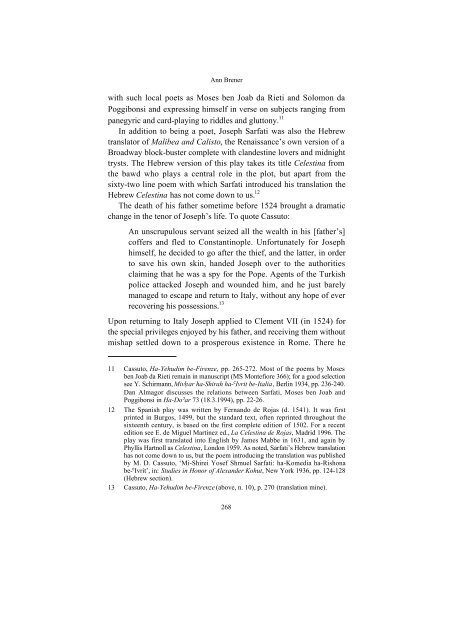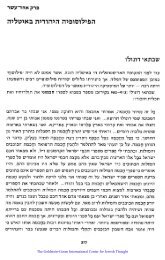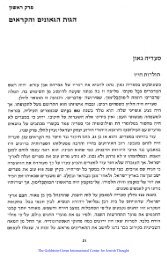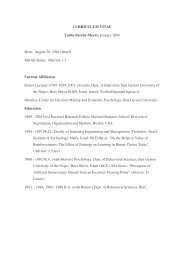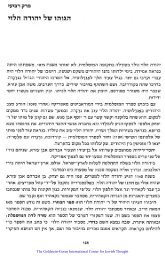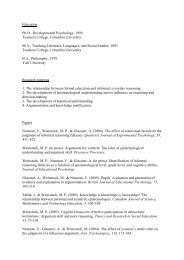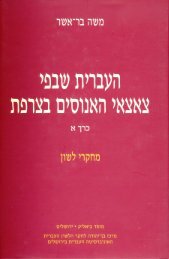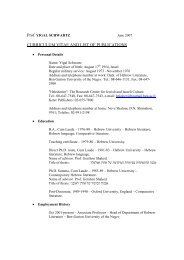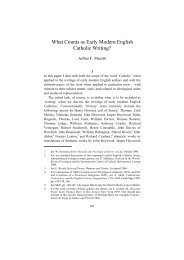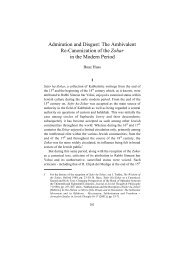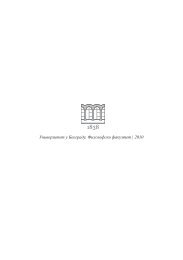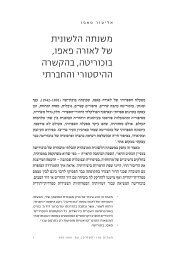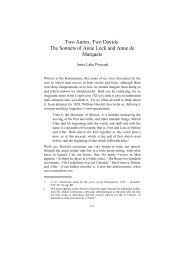A Poem by Joseph Sarfati in Honor of Daniel Bomberg's
A Poem by Joseph Sarfati in Honor of Daniel Bomberg's
A Poem by Joseph Sarfati in Honor of Daniel Bomberg's
Create successful ePaper yourself
Turn your PDF publications into a flip-book with our unique Google optimized e-Paper software.
Ann Brener<br />
with such local poets as Moses ben Joab da Rieti and Solomon da<br />
Poggibonsi and express<strong>in</strong>g himself <strong>in</strong> verse on subjects rang<strong>in</strong>g from<br />
panegyric and card-play<strong>in</strong>g to riddles and gluttony. 11<br />
In addition to be<strong>in</strong>g a poet, <strong>Joseph</strong> <strong>Sarfati</strong> was also the Hebrew<br />
translator <strong>of</strong> Malibea and Calisto, the Renaissance’s own version <strong>of</strong> a<br />
Broadway block-buster complete with clandest<strong>in</strong>e lovers and midnight<br />
trysts. The Hebrew version <strong>of</strong> this play takes its title Celest<strong>in</strong>a from<br />
the bawd who plays a central role <strong>in</strong> the plot, but apart from the<br />
sixty-two l<strong>in</strong>e poem with which <strong>Sarfati</strong> <strong>in</strong>troduced his translation the<br />
Hebrew Celest<strong>in</strong>a has not come down to us. 12<br />
The death <strong>of</strong> his father sometime before 1524 brought a dramatic<br />
change <strong>in</strong> the tenor <strong>of</strong> <strong>Joseph</strong>’s life. To quote Cassuto:<br />
An unscrupulous servant seized all the wealth <strong>in</strong> his [father’s]<br />
c<strong>of</strong>fers and fled to Constant<strong>in</strong>ople. Unfortunately for <strong>Joseph</strong><br />
himself, he decided to go after the thief, and the latter, <strong>in</strong> order<br />
to save his own sk<strong>in</strong>, handed <strong>Joseph</strong> over to the authorities<br />
claim<strong>in</strong>g that he was a spy for the Pope. Agents <strong>of</strong> the Turkish<br />
police attacked <strong>Joseph</strong> and wounded him, and he just barely<br />
managed to escape and return to Italy, without any hope <strong>of</strong> ever<br />
recover<strong>in</strong>g his possessions. 13<br />
Upon return<strong>in</strong>g to Italy <strong>Joseph</strong> applied to Clement VII (<strong>in</strong> 1524) for<br />
the special privileges enjoyed <strong>by</strong> his father, and receiv<strong>in</strong>g them without<br />
mishap settled down to a prosperous existence <strong>in</strong> Rome. There he<br />
11 Cassuto, Ha-Yehudim be-Firenze, pp. 265-272. Most <strong>of</strong> the poems <strong>by</strong> Moses<br />
ben Joab da Rieti rema<strong>in</strong> <strong>in</strong> manuscript (MS Montefiore 366); for a good selection<br />
see Y. Schirmann, Miv˙ar ha-Shirah ha-‘Ivrit be-Italia, Berl<strong>in</strong> 1934, pp. 236-240.<br />
Dan Almagor discusses the relations between <strong>Sarfati</strong>, Moses ben Joab and<br />
Poggibonsi <strong>in</strong> Ha-Do’ar 73 (18.3.1994), pp. 22-26.<br />
12 The Spanish play was written <strong>by</strong> Fernando de Rojas (d. 1541). It was first<br />
pr<strong>in</strong>ted <strong>in</strong> Burgos, 1499, but the standard text, <strong>of</strong>ten repr<strong>in</strong>ted throughout the<br />
sixteenth century, is based on the first complete edition <strong>of</strong> 1502. For a recent<br />
edition see E. de Miguel Mart<strong>in</strong>ez ed., La Celest<strong>in</strong>a de Rojas, Madrid 1996. The<br />
play was first translated <strong>in</strong>to English <strong>by</strong> James Mabbe <strong>in</strong> 1631, and aga<strong>in</strong> <strong>by</strong><br />
Phyllis Hartnoll as Celest<strong>in</strong>a, London 1959. As noted, <strong>Sarfati</strong>’s Hebrew translation<br />
has not come down to us, but the poem <strong>in</strong>troduc<strong>in</strong>g the translation was published<br />
<strong>by</strong> M. D. Cassuto, ‘Mi-Shirei Yosef Shmuel <strong>Sarfati</strong>: ha-Komedia ha-Rishona<br />
be-‘Ivrit’, <strong>in</strong>: Studies <strong>in</strong> <strong>Honor</strong> <strong>of</strong> Alexander Kohut, New York 1936, pp. 124-128<br />
(Hebrew section).<br />
13 Cassuto, Ha-Yehudim be-Firenze (above, n. 10), p. 270 (translation m<strong>in</strong>e).<br />
268


